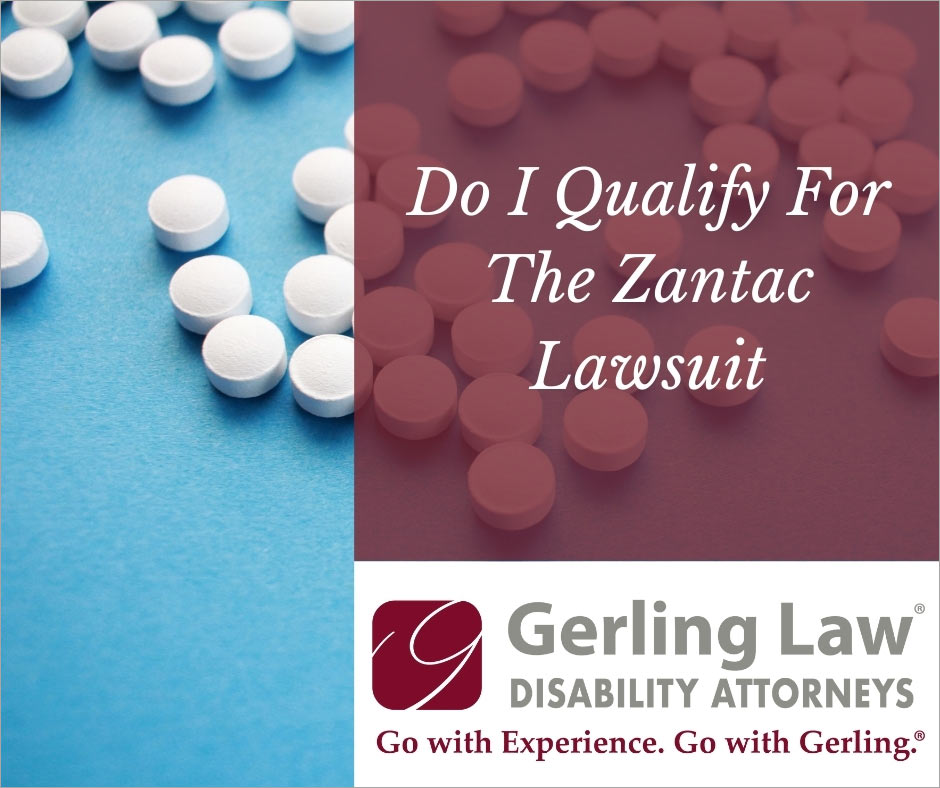
If you previously took Zantac and developed subsequent health problems, you may be entitled to pursue legal action for compensation.
Not everyone who has side effects will be eligible to bring a successful lawsuit, which is why it’s crucial to understand who actually qualifies for the Zantac lawsuit.
The FDA issued a warning that Zantac and its generic form ranitidine could cause cancer in some users. If you can show a cancer diagnosis linked to ranitidine usage, you may qualify to bring a Zantac lawsuit.
To learn more about pursuing a claim for damages, speak to a Zantac lawsuit attorney at Gerling Law today.
Send us a message or call (888) 437-5464 today for a free, no-obligation consultation.
What Is Wrong with Zantac?
Zantac is both a prescription and over-the-counter medication designed to decrease the amount of acid your stomach produces. It could help with heartburn, acid reflux, and other throat, gastrointestinal, and stomach issues. However, in April 2020, the FDA announced that companies should remove Zantac and its generic version ranitidine from their shelves as they discovered unacceptable amounts of NDMA.
The FDA’s permissible daily intake is listed at 96 nanograms. However, routine testing by the online pharmacy Valisure discovered levels exceeding three million nanograms per tablet.
NDMA In Zantac
NDMA is the chemical N-nitrosodimethylamine, which is an environmental contaminant. Low levels of NDMA are found in some foods and water. At minimal levels, there is no expectation that your risk for cancer will increase. However, higher levels of exposure could increase your risk of cancer.
Numerous studies have shown a link between NMDA and cancer in both animals and humans. It’s been known to cause cancer in animals and is probably carcinogenic to humans. It’s also the same carcinogen that led to a recall of the blood pressure drug Valsartan in 2018.
Some studies on NDMA date back 40 years, and evidence suggests that manufacturers concealed the fact that there’s a potential link to cancer. By hiding this fact, companies like Sanofi and Boehringer Ingelheim profited significantly. Zantac was one of the first drugs to generate one billion dollars in sales.
There are multiple theories on what causes NDMA to become carcinogenic in products like Zantac. There is a possibility that ranitidine’s inherent instability results in a chemical reaction that creates high levels of NDMA in your digestive tract. When nitrates are present, the chances increase. The FDA says NDMA is found in Zantac. Storing it at a temperature higher than room temperature could result in even higher NDMA levels.
What Type of Cancer Does Zantac Cause?
Research into the link between NDMA and cancer is ongoing.
Some types of cancer that could result from NDMA exposure in ranitidine include:
- Stomach cancer,
- Esophageal cancer,
- Colorectal cancer,
- Bladder cancer,
- Intestinal cancer,
- Throat/nasal cancer,
- Pancreatic cancer,
- Liver cancer,
- Breast cancer,
- Lung cancer (non-smokers), and
- Prostate cancer.
There could be other types of cancers related to Zantac use as well.
These could include:
- Kidney cancer,
- Brain cancer,
- Thyroid cancer,
- Leukemia,
- Islet cell tumors,
- Multiple myeloma, and
- Non-Hodgkin’s lymphoma.
If you have any of these types of cancer, it’s crucial to speak with a knowledgeable Zantac lawsuit attorney who can assist you.
Contact Us for Help With Your Zantac Claim
Who Is Suing Zantac?
The initial lawsuit for Zantac was filed against Sanofi and Boehringer Ingelheim in California. The plaintiffs allege that these drug makers knew or should have known that Zantac was contaminated with a chemical with links to cancer.
The plaintiffs suing Zantac are those people who developed cancer after taking ranitidine. There are already hundreds of plaintiffs, and the list is expected to grow by thousands more. There are several class-action suits, including plaintiffs who have used ranitidine but have not gotten sick. The plaintiffs in these suits are looking for reimbursement for the cost of the medication, and some are seeking equitable relief, such as medical monitoring.
More manufacturers produced ranitidine tablets than just Sanofi or Boehringer.
Other ranitidine products recalled in the FDA April 2020 release include:
- AHP (American Health Packaging)—ranitidine liquid unit dose cups and ranitidine tablets USP 150mg;
- Amneal (Amneal Pharmaceuticals, LLC)—ranitidine tablets 150mg and 300mg and Ranitidine syrup (Ranitidine Oral Solution, USP), 15 mg/mL;
- ANI (Appco Pharma LLC)—ranitidine tablets 150mg and 300mg;
- Apotex Corp. (Apotex Corp sold at Rite Aid, Walmart, and Walgreens)—ranitidine tablets 75mg and 150mg;
- Aurobindo & DG Health (Aurobindo Pharma, USA, Inc.)—ranitidine tablets and capsules 150mg;
- Glenmark (Glenmark Pharmaceuticals, Inc)—ranitidine tablets 150mg and 300mg.;
- Golden State Medical Supply, Incorporated (GSMS, Inc and Novitium Pharma LLC.)—ranitidine HCI 150mg and 300mg capsules;
- Lannett Company, Inc.—ranitidine syrup (ranitidine oral solution, USP) 15mg/mL;
- Northwind (Denton Pharma, Inc. dba Northwind Pharmaceuticals)—ranitidine tablets 150mg and 300mg;
- Perrigo Company PLC—ranitidine;
- Precision Dose (Amneal Pharmaceuticals)—ranitidine oral solution, USP 150mg/10mL;
- Dr. Reddy’s (Dr. Reddy’s Laboratories Ltd. sold at Kroger, Walgreens, Sam’s Club, CVS, and more)—ranitidine tablets and capsules; and
- Sandoz Inc.—ranitidine hydrochloride capsules 150mg and 300mg.
If you still have any of these medications in your possession, keep the empty prescription bottles or other evidence that can help your lawsuit. However, you should properly destroy unused medicines following the FDA disposal guidelines.
Who Actually Qualifies for the Zantac Lawsuit?
To sue for Zantac-related cancer, you must meet the eligibility requirements. To start, you need to prove that you were taking Zantac. If you received a prescription for it, establishing usage is easier. If you took the over-the-counter version, it could be more challenging. You will need to gather any evidence that shows you took Zantac.
Helpful evidence can include:
- Prescription records from your doctor;
- Pharmacy prescription records;
- Prescription bottles or packaging; and
- Purchase receipts.
If you don’t have any of the items mentioned above, there may still be a way you can show proof.
Very few people keep their bottles or receipts for medications, but you could also try to find records through the following:
- Health saving accounts (HSA),
- Rx prescription drug cards,
- Health reimbursement accounts (HRA),
- Health flexible spending accounts (FSA), or
- Declarations or affidavits that you took over-the-counter Zantac.
Next, you must have received a cancer diagnosis that aligns with one or more of the cancer types associated with exposure to NDMA. If your type of cancer does not relate to those linked to Zantac, you won’t be able to bring a successful suit.
Showing a link between your cancer diagnosis and Zantac is also necessary. You can be diagnosed with one of the types of cancer linked with NDMA, but that’s not enough to prove a connection. You should have been taking Zantac for a certain amount of time, perhaps a year or more. Being diagnosed with stomach cancer and taking Zantac a few times won’t be enough to show causation.
What Is the Average Payout for the Zantac Lawsuit?
The first lawsuit was filed only around a year ago, and the FDA recall was April 2020. Understandably, potential plaintiffs want to know what their Zantac case is worth and what the range of individual payouts might be. However, since the investigative phase is in the early stages, it’s impossible to provide an average payout amount yet. If you compare a Zantac lawsuit to similar mass tort cases involving cancer, it’s not unthinkable that the average settlement payout could be as high as $500,000.
The average payout will ultimately depend on how many lawsuits are filed and the total settlement amount. Look at Takeda Pharmaceuticals, for example. More than 10,000 lawsuits were filed against them for Actos, a Type 2 diabetes drug. The lawsuits alleged Takeda failed to warn patients of life-threatening risks such as bladder cancer, heart failure, and more. Ultimately, Takeda settled around 9,000 claims for $2.4 billion.
If all claims were settled equally, that would be approximately $266,000 per plaintiff.
Consult with a Zantac Lawsuit Attorney Today
If you took Zantac or its generic ranitidine and developed one of the potentially related cancers, you need to speak with a Zantac lawsuit attorney right away.
The team has more than 50 years of experience helping our clients get the justice they deserve. All drug manufacturers are obligated to ensure their products do not harm consumers. If you were harmed by Zantac or any ranitidine drug, we can help you file a lawsuit against the manufacturer and any other parties who contributed to your damages.
To learn more about how we can help you with a lawsuit against Zantac, contact Gerling Law today at (888) 437-5464 or fill out our free online case review form. Remember,
Go with Experience. Go with Gerling. ®

